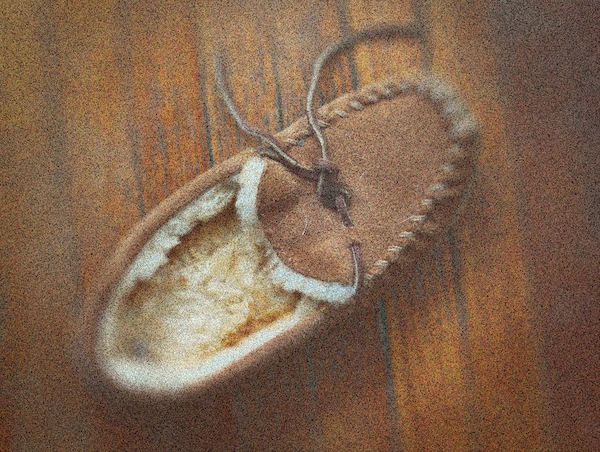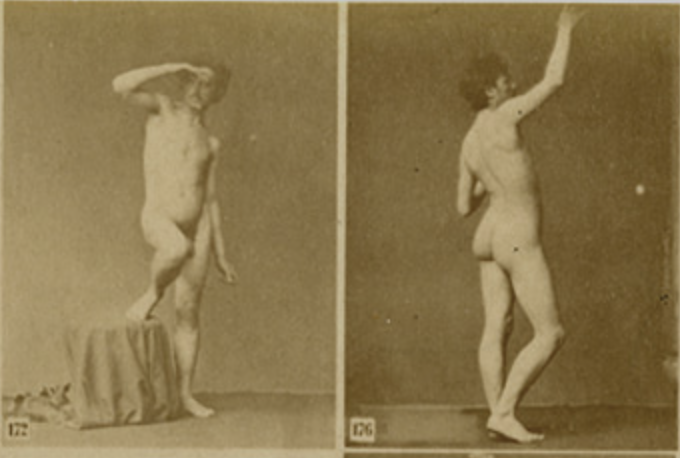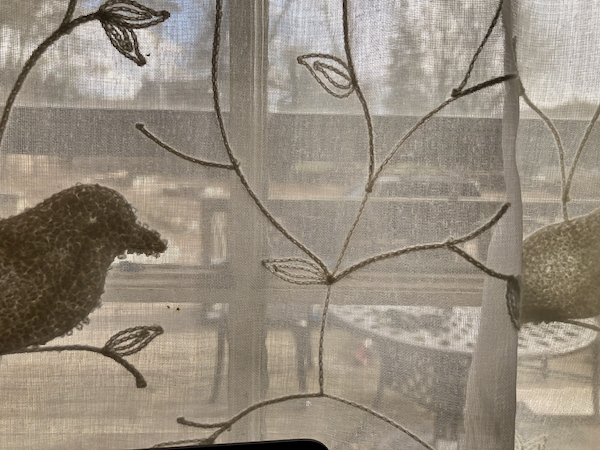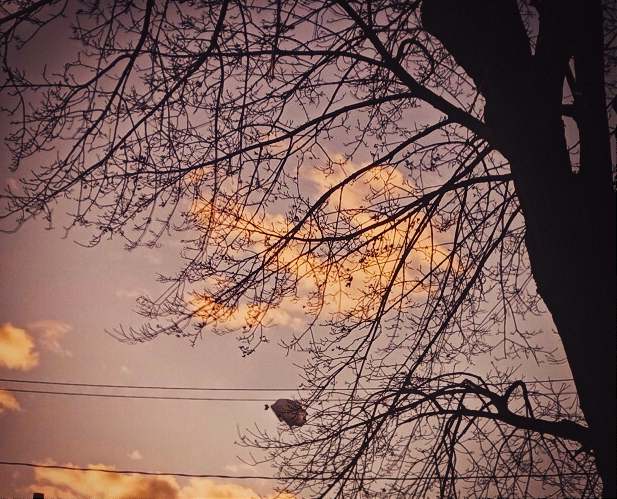
Ideation
by Elle Nash
It began when she moved in below their apartment, or maybe it began a week after when the boyfriend came downstairs to ask for a cup of sugar for a cake, or maybe it began a week after that when the girlfriend knocked on the door and asked for a cigarette and she didn’t have any, so she said, “I’ll go get some,” when what she meant was: “Please come with me,” because the town was new and she liked the girlfriend’s long, dirt-colored hair.
The girlfriend twisted the ends of that hair, patchy like sod in a hot yard that didn’t take, the ends brittle from chlorine pools and heat straightening, bleached and ratty but silky at the roots where the natural color was a deeper, more luxurious dirt color. “I hope you like Kools,” she said to the girlfriend, and she walked with her up the street, past the drainage ditch wet with grass, the night empty, the way small towns desert themselves after dinner, not a bright, living city, but potholed and sanctioned nonetheless, not a place where marijuana was legal. She touched the girlfriend’s hand, the skin soft and young. “I meant Benson and Hedges,” she said, remembering herself at the girlfriend’s age. “I used to listen to punk music all the time.”
“Punk music?” the girlfriend said. She clutched her hand as they rounded the last corner to the liquor store, a cement-brick building with a neon American flag in the window. “You know, anarchy? Fuck the USA?” she said. The girlfriend remained quiet, pulling the ends of her twill jacket over her free hand, and glanced across an abandoned lot, where a strip mall used to be. Then she touched her thumb and index finger together and brought them to her mouth: “Why would you leave the place you came from?”
“So, your secrets then,” the girlfriend said. She didn’t care if the girlfriend wanted her company for the free liquor or cigarettes since she wanted something from her, too. This was how friendship worked as an adult: an exchange of goods or services for other goods or services. “I don’t mind keeping secrets with you,” she said, deploying the same line she used three dates a week while unbuttoning the jeans of incompetent clients, most of them older, grainy-skinned and bitter, losing their wives to indifference. She was happy to share them so long as the girlfriend was interested. “But what about him?” she asked, itching for a cigarette now.
The boyfriend was soft-faced and had long lashes and small, cherubic hands she’d noticed when she gave him the sugar. When he talked his voice cracked. There was the girlfriend’s mother, too, living with them—forty years old, curling tawny hair, drinking Natty Lights and always asking if she could take her top off at the parties. There were so many parties.
The girlfriend said he’d chased her once, the boyfriend stumbling through the apartment and then on to the balcony with a small frosting knife, and the girlfriend had yelled for someone to call the cops. “He’d taken my phone,” the girlfriend said. “My mom didn’t do anything.”
“Have you called the cops before?” she asked.
“Yeah, but he becomes docile and they leave.”
“Why would you stay?” she asked, but the wind had picked up by then, and she saw the liquor store’s cashier stare at them from the window, his nose trimmed with the hard, buzzing red of the neon flag. She left the girlfriend at the side of the building and came back out with another handle of gin and another pack of smokes. A stiff, old lemon in her jacket pocket.
“Tell me about your clients,” the girlfriend said. She told the girl about a man and woman who were in love with each other. They liked for her to teach them how to touch. Their touching was not clumsy or new but fearful, and she told the girl about the bright splotches of pink on the woman’s body, across her cheeks and nose and down her breast. “She had ulcers in her mouth,” she said. “Some chronic disease.”
Another couple, another town—she used to let them tie her up and feed her GHB from a trinket-like vial. “I wanted to obliterate,” she said, “They liked to pretend I was their daughter. I was sadder then, a lot like you,” then she said, “I’m sorry.”
At the girlfriend’s apartment, they were free to drink again and warming up. The girlfriend removed her jacket. The girlfriend’s mother asked, “Are you a Hot Topic girl?” She shook her head and flicked a clear blue lighter beneath a cigarette, and the girlfriend’s mother asked, “Are you a witch?” The girlfriend’s mother took off her blouse, danced some, and opened the closet looking at her daughter’s clothes. The girlfriend’s mother tried them on, one at a time, each shirt smaller than the next.
“There was a baby once,” she whispered to the girlfriend. Before the misoprostol, she could only think about death or some form of it in her life. The girlfriend leaned into her on the couch and checked the time on her phone. “I don’t want you go to work tonight,” the girlfriend said.
The girlfriend’s mother put a heavy arm around her and breathed into her ear. “I’m so glad my girl is here now, and not at the old house,” the girlfriend’s mother said, the old house with no plumbing or heating. “They kept shitting on the back deck, it just wasn’t right.” Torn linoleum, candled light. Shaking her head, she placed the shot glass over the top of the gin bottle.
The girlfriend’s phone thumped twice in her hands. “Don’t answer it,” the girlfriend’s mother said. “He’ll show up,” the girlfriend said. The mother changed her outfit again, putting on a pair of her daughter’s leggings and a crop top, the mother’s bra peeking from the hem. Then the mother picked up a box of remaining beer and the bottle of gin and looked at her. “Shall we?” the mother asked, and they went downstairs.
In the apartment below, she locked the door and drew the blinds. She had no furniture, a blanket laid out on the floor, and a cardboard box for a table. She sat on the kitchen counter swinging her legs like a child. The girlfriend slipped off her moccasins and opened the kitchen window at the back, blowing pale clouds of cigarette smoke into the night.
The mother unclasped her orthopedic bra. Bulbous, full breasts, which hung to the sides, areola as wide as her fist. She wanted to look; the girlfriend caught her trailing eye. “She is so fucking easy,” the girlfriend said.
She liked the girlfriend’s breasts, too. Her skinny ribcage, the way her sports bra compressed them close to her chest. Girls like that—their sharp chins pressing into her neck, the spidery way their fingers searched her body—it was how she wanted to be touched. Now she wasn’t afraid of death so much as she was scared of running out of time. She worried about giving birth to an already dead child, or one who was alive and going to die. What would it mean to spend so much time obsessing over resources?
The girlfriend looked bored, so she joked, “Sometimes the only thing in my stomach is cum, scrambled eggs, and coffee.” She said, “Blow jobs are Ambien for bad boys.” The girlfriend laughed, bright and soapy, and she liked the way her eyes ticked, gave way to surprise.
They took shots and she asked about the boyfriend, asking again: why do you stay? Asking more, imagining the girlfriend plodding through the apartment, the boy with his weak chin and a dull kitchen knife. Why couldn’t the girlfriend leave? The girlfriend pressed a thumb into the skin stretched on her jaw. She was embarrassed by how beautiful the girlfriend was. Pink paint peeled from her fingernails.
“One time, in another city,” she said, slowly caressing the metal lip of the vial in her pocket, “I might’ve gotten away with murder.” It’d been the last time, with a man that looked like her father, the filmy gray of his eyes. His beleaguered breath, erratic and wheezing as he lay on the creamy foreign sheets in a room that overlooked an entire skyline. She was tired of taking tiny capfuls of the drug to cope; it’s salty aftertaste like magnesium in her mouth. The man had downed his rum and Coke in a single sweep before collapsing. He convulsed once, then twice, rattling his teeth together, and then he threw up a rusty sludge. A wet, throttling sound came from his throat like he was choking. She’d panicked, pressing her hands into his doughy shoulders to roll him on his side. The girlfriend’s eyes grew curious and a question seemed to hover inside her mouth before a heavy rap came from the door, breaking through the pop music. All three of the women turned their heads, the flirty dream dissipating. It was the first time anyone had knocked on her door since she’d moved in.
An older man with slicked-back hair and straight teeth loomed through the crack at her. Behind him, the soft-faced boyfriend. “Leah needs to come home,” said the older man. “So what?” she said, but the mother had already slipped on her top and had taken the girlfriend by the hand, coaxing her back up the stairs before the girlfriend even had time to slip on her moccasins.
The door shut, both the mother and girlfriend gone. She pulled the vial out of her pocket. It was enough to put a man in the dirt, but not a man and a boy. She didn’t feel like running again, couldn’t think of another town to move to. It wasn’t enough to change things, she thought. She wedged the murky vial inside the toe of one of the girlfriend’s moccasins, anyway. Death was a reminder that choice was a luxury. She tucked the shoes in her arms and opened the front door, into the cool night.
Elle Nash is the author of Animals Eat Each Other and Nudes, forthcoming from SF/LD Books in 2021. Her short stories and essays appear in Guernica, The Nervous Breakdown, Literary Hub, New York Tyrant and elsewhere. She is a founding editor of Witch Craft Magazine and teaches a fiction workshop called Textures. You can find her on Twitter @saderotica.






